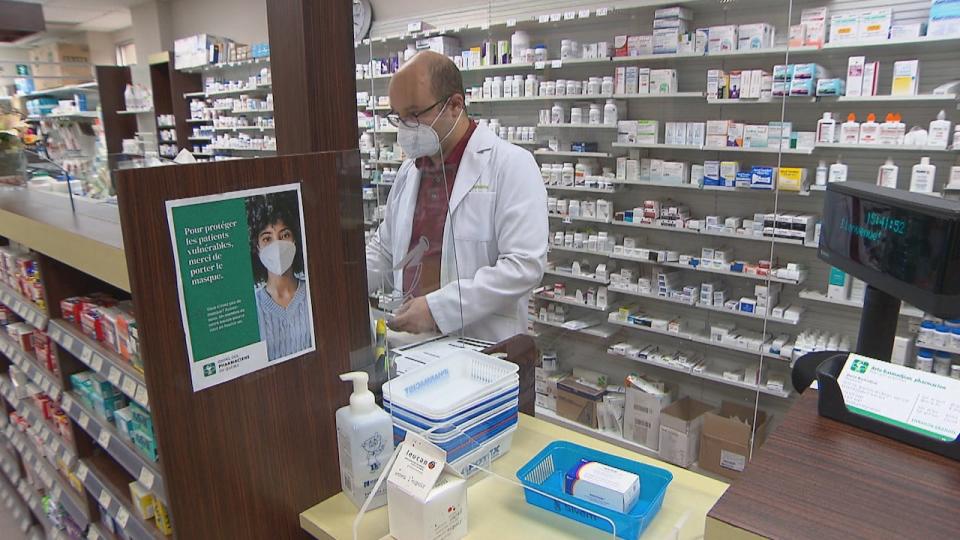U.S. allowing Florida to import drugs from Canada, reviving fears of shortages

The U.S. Food and Drug Administration is allowing Florida to import what could amount to millions of dollars worth of prescription drugs from Canada — but the federal government says there are safeguards in place to prevent shortages north of the border.
Florida has estimated that purchasing prescription drugs from Canadian wholesalers to treat such conditions as HIV/AIDS, diabetes and hepatitis C could save the southern state $150 million US annually.
Marking a shift in U.S pharmaceutical policy, the FDA approved Florida's request. In a letter to the state government dated Friday, the director of the administration signed off on the proposal and said that importing medications from Canada could "significantly reduce the cost of covered products to the American consumer without posing additional risk to the public's health and safety."
The sunshine state is one of a handful that have applied for permission to import wholesale prescription drugs from Canada, meaning Friday's approval could be just the first of several.
Canada — which set up a federal regulatory agency decades ago to ensure patent drug prices are not excessive — has resisted such import plans for years.
In a media statement, federal Health Minister Mark Holland said Canada has regulations in place to protect its supply.
"I want to assure Canadians that they will continue to have access to medications they need when they need them," he said.
"Canadians can be confident that our government will continue to take all necessary measures to protect the drug supply in Canada."

In a media statement, federal Health Minister Mark Holland said Canada has regulations in place to protect its drug supply. (Sean Kilpatrick/The Canadian Press)
Health Canada said there are provisions under the Food and Drugs Act that prohibit certain drugs from being sold outside of the country "if that sale could cause, or worsen, a drug shortage in Canada."
"This includes all drugs that are eligible for bulk importation to the U.S., including those identified in Florida's bulk importation plan, or any other U.S. state's future importation programs," a Health Canada spokesperson said in a media statement.
"Health Canada is actively monitoring the Canadian drug supply and continues to ensure that Canadians have access to the drugs that they need."
Joel Lexchin, a retired emergency physician who studies pharmaceutical policy, said it's still not clear if Florida's plan will actually pan out.
"But if it goes ahead, then we should be worried," he said.
"Canada has 40 million people. Florida has more than half of that, so 22 million people. We can't supply Florida with the drugs that they may need without doing damage in Canada."
Lexchin said the U.S. is "attempting to use Canada to solve a relatively unique American problem.
"The U.S. government, amongst all the other OECD countries, doesn't allow price negotiations with manufacturers. So drug companies are free to set whatever prices they want. Here in Canada, we control prices so our prices for brand name drugs tend to be two and a half to three times lower than the U.S. prices."
Pharmacists' group calls for calm
Joelle Walker, vice president of public affairs for the Canadian Pharmacists Association, said the FDA's decision is "certainly not good news for Canadians" but she shares Lexchin's doubts about Florida starting bulk imports any time soon.
"Historically, we've had some pretty devastating drug shortages in Canada. And so the idea that they could import them from us is not really feasible," she said.
"I'm skeptical that it will actually come to fruition in its current form, but we want to make sure that we're diligent about reviewing it and making sure that we're not missing something."
Walker urged Canadians not to rush out to stock up on their prescriptions, which could trigger shortages.
"Don't be alarmed today. This certainly isn't happening tomorrow. This may never happen. So don't rush to your pharmacy, don't be concerned about it right now," she said.
"Hopefully, the measures that we have in place will help sort of restrict that flow from Canada to the United States."

The Canadian Pharmacists Association is urging Canadians not to rush out to stock up on their prescriptions in wake of the U.S. FDA's decision. (CBC/Radio-Canada)
This debate is not new. In 2019, then-U.S. president Donald Trump proposed a rule to allow wholesale bulk imports of prescription drugs, promising it would be a "game changer for American seniors."
Within months, the Canadian government blocked bulk exports of some prescription drugs to stave off the risk of shortages at home.
Health Canada issued a statement at the time saying approximately 10 to 15 per cent of drugs have been in short supply in Canada "at any given time" since 2017.
Lexchin said that while the Canadian government has brought in regulations to avoid mass exports, drug shortages — like the shortage of children's Tylenol in 2022 — can be hard to predict.
"If drugs are being made in a single plant, and there's a fire in the plant, or they discover there's contamination, that creates a shortage without any real warning," he said.
"So if we are committed to exporting large amounts of drugs, when a shortage comes up, then we may be on the short end of the stick."
Americans have been buying drugs from Canada for some time.
Pharmacists along the border have reported U.S. citizens making the trek to stock up on cheaper medicine, including insulin and Ozempic, a prescription diabetes treatment that has skyrocketed in popularity recently as an off-label drug for weight loss.
"People driving over the the border and coming and getting a little bit at a time, that wasn't really jeopardizing our supply," said Walker.
"But we've had recent examples in B.C., for example, where the importation of Ozempic was actually leading to a potential shortage because the numbers were so high."
Decision could harm Canadians, warns trade group
Innovative Medicines Canada, a trade group that represents about 50 pharma companies, said allowing Florida to import drugs meant for Canadians could "disrupt" Canada's health-care system.
"Canada simply can't supply drugs to Florida, or any other U.S. states, without significantly increasing the risk and severity of drug shortages nationwide," David Renwick, interim president of Innovative Medicines Canada, said in a statement.
"The U.S. market is nearly 10 times bigger than Canada's, and allowing drugs that were intended for Canadians to be exported to the U.S. would harm Canadian patients and disrupt our health-care system."
The head of Pharmaceutical Research and Manufacturers of America (PhRMA), one of the largest pharmaceutical industry lobby groups in the U.S., called the FDA's decision "reckless."
"Ensuring patients have access to needed medicines is critical, but the importation of unapproved medicines, whether from Canada or elsewhere in the world, poses a serious danger to public health," said PhRMA president Stephen Ubl in a media statement.
"PhRMA is considering all options for preventing this policy from harming patients."

